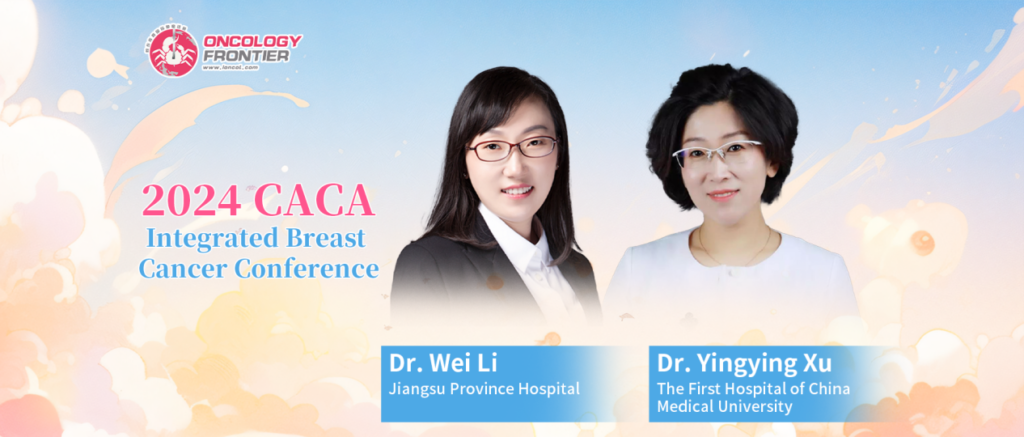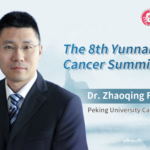
Editor's Note: The Chinese Anti-Cancer Association, adhering to the tenet of "prevention, screening, diagnosis, treatment, and rehabilitation," has launched the "Chinese Tumor Integrated Diagnosis and Treatment Guidelines." At the 2024 CACA Integrated Breast Cancer Conference, "Oncology Frontier" invited three authoritative experts from internal medicine, surgery, and radiotherapy—Dr. Man Li from The Second Hospital of Dalian Medical University, Dr. Yingying Xu from The First Hospital of China Medical University, and Dr. Jiayi Chen from Ruijin Hospital, Shanghai JiaoTong University School of Medicine—to discuss the comprehensive management of breast cancer patients under the theme of "Integration for Prevention, Screening, Diagnosis, Treatment, and Rehabilitation." Under the moderation of Dr. Wei Li from Jiangsu Province People's Hospital, the three experts explored key aspects of comprehensive breast cancer management from personalized treatment, multidisciplinary collaboration, minimally invasive techniques, to new advancements in radiotherapy, providing valuable practical experience and theoretical guidance for future breast cancer management.Dr. Wei Li: The Chinese Anti-Cancer Association, upholding the tenet of “prevention, screening, diagnosis, treatment, and rehabilitation,” has formulated the “Chinese Tumor Integrated Diagnosis and Treatment Guidelines,” the first of its kind in China and the first in the world to propose a comprehensive management system of “prevention, screening, diagnosis, treatment, and rehabilitation.” Our discussion today is based on this content, and we have invited three domestic experts in the field of breast cancer (internal medicine, radiotherapy, and surgery) to analyze patient management from different perspectives.
Our next expert is Dr. Yingying Xu. Could you discuss from a surgical perspective how to collaborate closely with other disciplines (such as internal medicine and radiotherapy) during the surgical treatment of breast cancer patients to ensure effective preoperative and postoperative care and achieve the best therapeutic outcomes?
Dr. Yingying Xu: The concept of “winning through integration in tumor prevention and treatment” is deeply rooted in the comprehensive treatment of breast cancer. Previously, early-stage breast cancer treatment was surgery-centered with other treatments as adjuncts. Today, the treatment philosophy has evolved to combine surgery and systemic treatments equally. For example, for a patient with locally advanced inoperable breast cancer, we should follow the multidisciplinary treatment (MDT) approach, collaborating with departments like radiology and radiotherapy for MDT discussions. Working with radiology helps us determine the tumor size and stage; if it’s stage IV breast cancer, systemic treatment should be conducted first, followed by exploring the feasibility and timing of surgery. For locally advanced breast cancer, collaboration with oncology for neoadjuvant therapy to downstage the tumor for operability is necessary before proceeding with surgery.
Additionally, for high-risk subtypes like HER2-positive or triple-negative breast cancer with tumors larger than 2 cm or positive lymph nodes, neoadjuvant therapy should be prioritized. During neoadjuvant therapy, cooperation with other disciplines is essential, such as working with radiology to assess tumor response and with ultrasound for baseline marking of primary lesions and positive lymph nodes. Post-surgery, pathologic assessment of the tumor requires collaboration with pathology, and based on the degree of pathological response, we need to work with oncology and radiotherapy to formulate adjuvant treatment plans. Hence, managing breast cancer patients requires multidisciplinary cooperation throughout the treatment process, exemplifying integrated treatment.
Dr. Wei Li: Professor Xu explained the overall treatment process, emphasizing the need for multidisciplinary cooperation with other departments like radiology, pathology, radiotherapy, and internal medicine for comprehensive patient management. Thank you, Professor Xu.
With the advancement of minimally invasive surgical techniques, the physical and psychological impacts of breast cancer surgery on patients are gradually decreasing. Dr. Yingying Xu, from a surgical perspective, could you discuss how minimally invasive surgery can be integrated into the “prevention, screening, diagnosis, treatment, and rehabilitation” system to enhance overall patient quality of life?
Dr. Yingying Xu: Breast surgery has evolved from maximum tolerance to minimal effective treatment. Minimally invasive techniques not only refer to endoscopic technologies but also broader concepts like breast conservation and axillary conservation, which represent less invasive approaches. For comprehensive surgical management, the feasibility of minimally invasive surgery must be considered, with prevention and screening being the foundation. As Dr. Man Li mentioned, extensive prevention and screening work has led to the detection of more early-stage breast cancer and small tumors, enabling more patients to undergo minimally invasive surgery.
Advances in treatment philosophy, drugs, and processes have also promoted the minimally invasive approach in surgery. For instance, neoadjuvant therapy enables some early-stage inoperable patients to become operable, conserving both the breast and axilla. Future advances in imaging technology will further refine margin definition and lymph node detection, allowing more precise minimally invasive surgeries.
The breast is not only a functional organ for women but also crucial for aesthetic appearance. Minimally invasive breast surgery significantly aids psychological recovery. In the future, alongside physical recovery, psychological recovery work needs to be enhanced as part of comprehensive management.
Dr. Wei Li: Indeed, as Professor Xu mentioned, the implementation of minimally invasive techniques in clinical practice has provided patients with both physical and psychological recovery. This recovery facilitates the further development of minimally invasive techniques. Thank you again, Professor Xu.
Dr. Yingying Xu
- Director of Breast Surgery, The First Hospital of China Medical University
- Professor/Chief Physician, Doctoral Supervisor
- Liaoning Provincial Distinguished Professor
- Member of the Oncology Branch, Chinese Medical Association
- Member of the Breast Tumor Group, Oncology Branch, Chinese Medical Association
- Standing Committee Member of the Youth Council, Chinese Anti-Cancer Association
- Member of the Breast Cancer Professional Committee, Chinese Anti-Cancer Association
- Deputy Chair of the Youth Committee, Breast Cancer Professional Committee, Chinese Anti-Cancer Association
- Deputy Chair of the Tumor Branch, Liaoning Medical Association
- Visiting Scholar at MD Anderson Cancer Center
- Principal Investigator of four National Natural Science Foundation projects and over ten provincial and ministerial projects
- Recipient of seven provincial and ministerial science and technology progress awards and the ninth Liaoning Youth Science and Technology Award
- Selected for the Liaoning Province Hundred, Thousand, and Ten Thousand Talent Project (Top 100)
- Recipient of the Liaoning Province Science and Technology Innovation Leader title
Dr. Wei Li
- Jiangsu Province Hospital, Department of Oncology
- Doctor, Chief Physician, Associate Professor, Master’s Supervisor
- Member of the Breast Cancer Expert Committee, Chinese Clinical Oncology Society (CSCO)
- Standing Committee Member of the Youth Expert Committee, Chinese Clinical Oncology Society (CSCO)
- Member of the Breast Cancer Professional Committee, Chinese Anti-Cancer Association
- Member of the Tumor Targeted Therapy Professional Committee, Chinese Anti-Cancer Association
- Deputy Chair of the Yangtze River Academic League Breast Cancer Alliance (YBCSG)
- Standing Committee Member of the Tumor Molecular Targeted Therapy Professional Committee, Jiangsu Province Research Hospital
- Member of the Cancer Rehabilitation and Palliative Care Professional Committee, Jiangsu Anti-Cancer Association
- Young Talent of the “Science and Education Prosperity Project” in Jiangsu Province
- Visiting Scholar at the University of South Carolina School of Medicine


